新概念英语二册Lesson 69 But not murder! 并非谋杀!超详教案讲义笔记
文档属性
| 名称 | 新概念英语二册Lesson 69 But not murder! 并非谋杀!超详教案讲义笔记 | 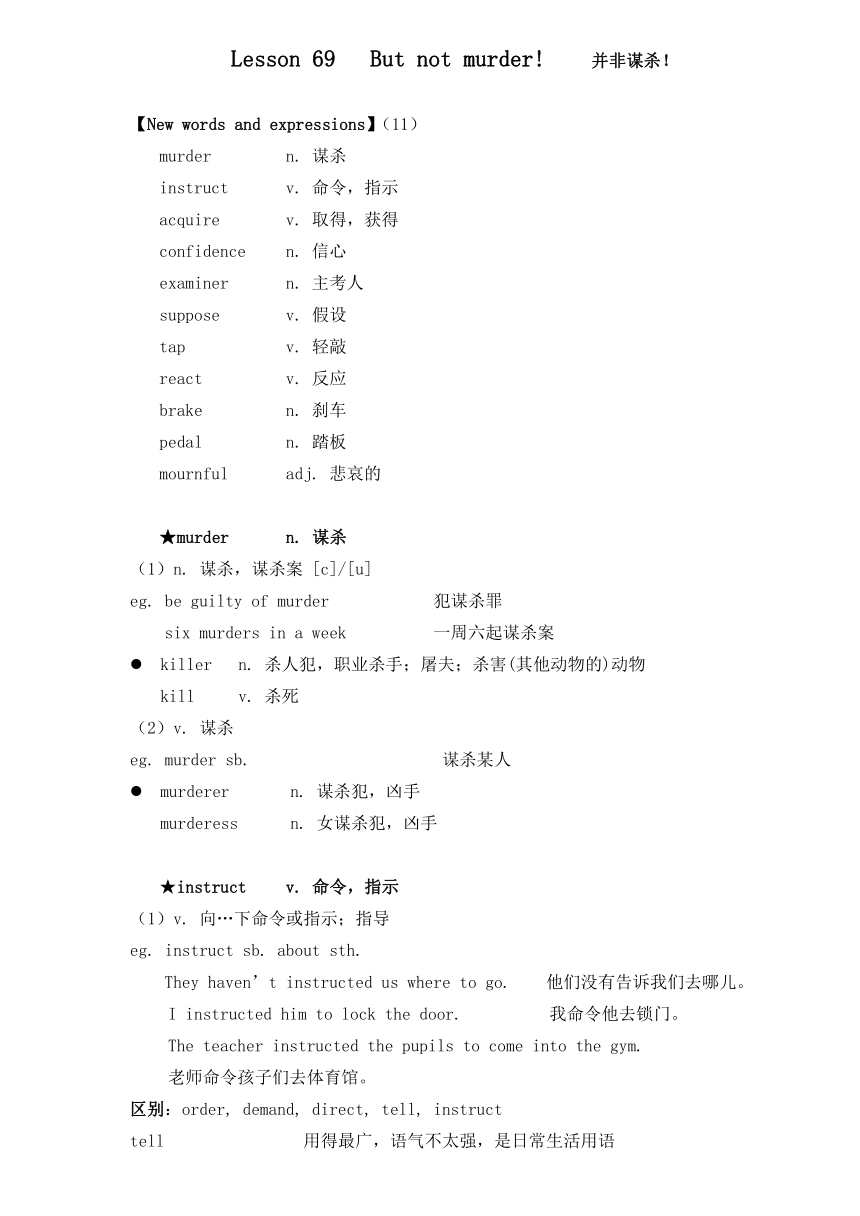 | |
| 格式 | docx | ||
| 文件大小 | 37.7KB | ||
| 资源类型 | 教案 | ||
| 版本资源 | 新概念英语 | ||
| 科目 | 英语 | ||
| 更新时间 | 2023-09-26 06:36:15 | ||
图片预览

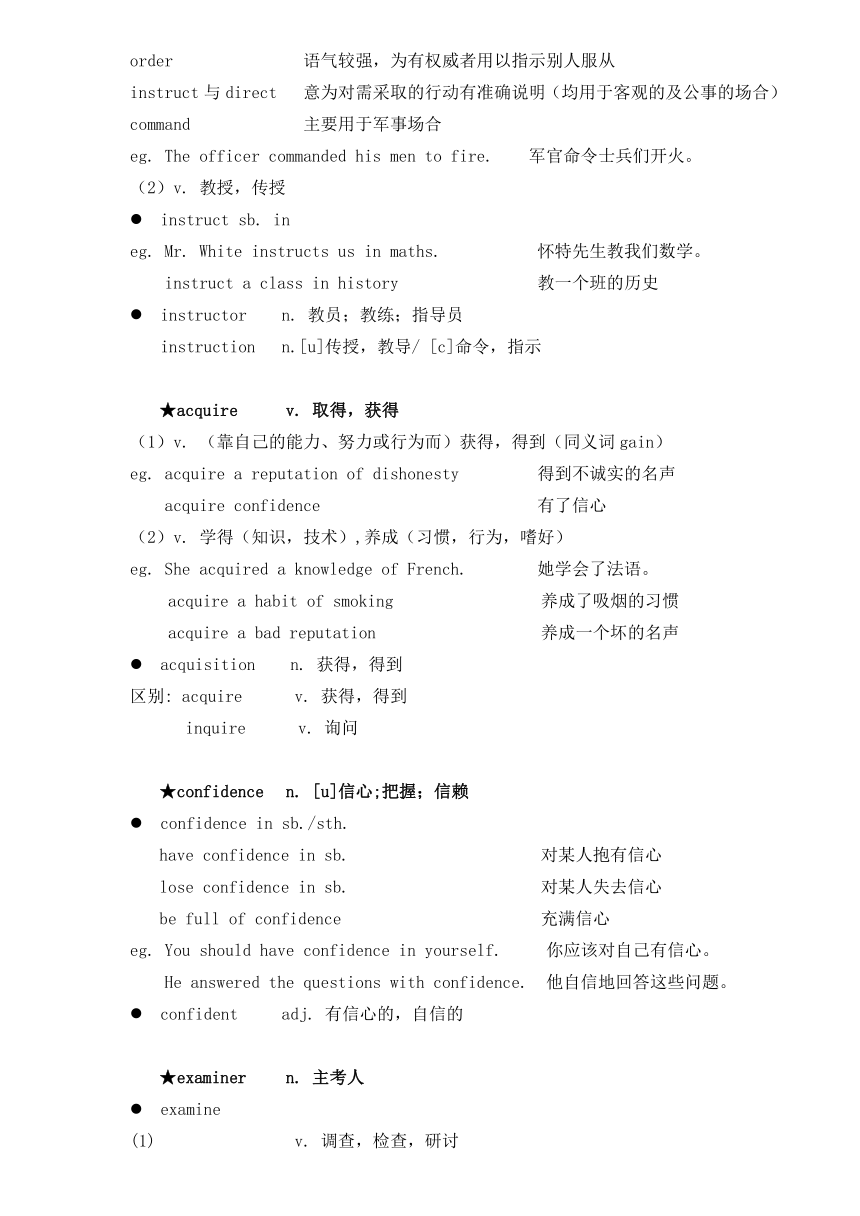
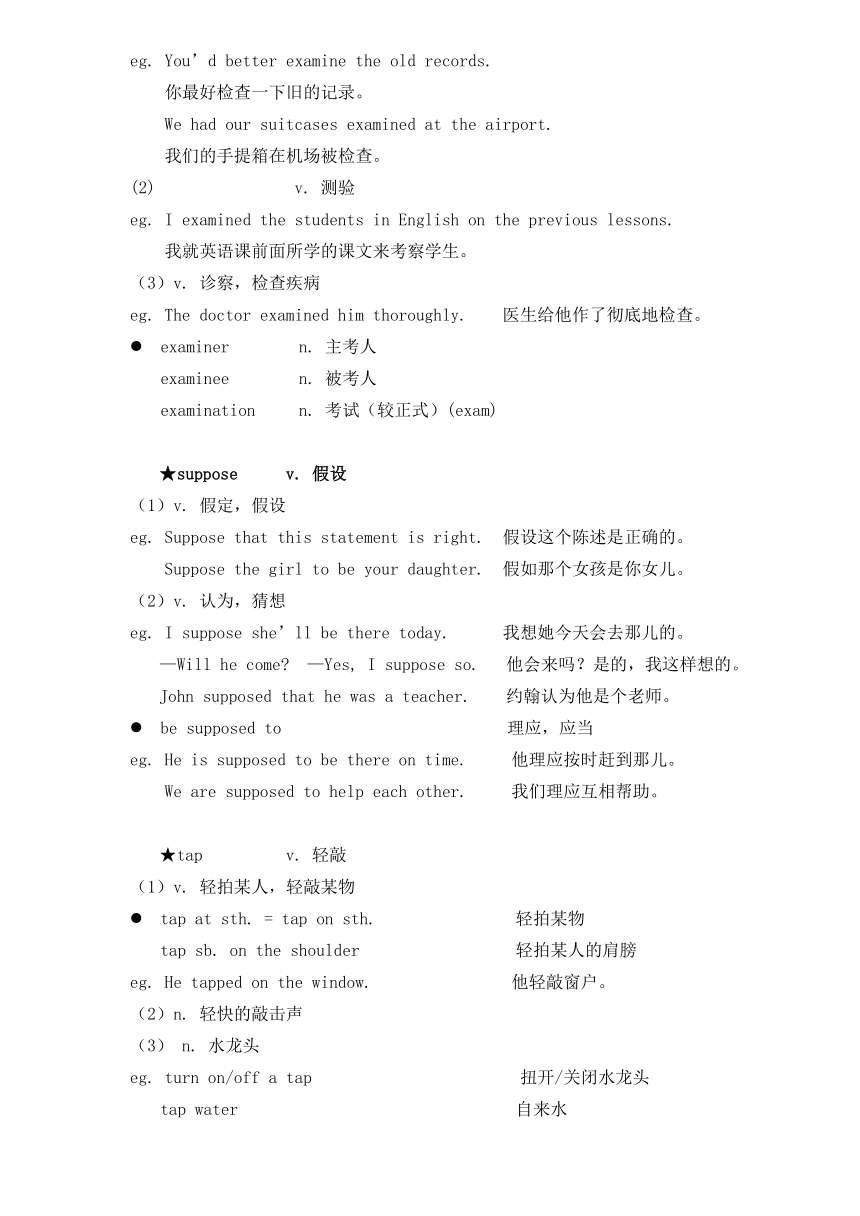
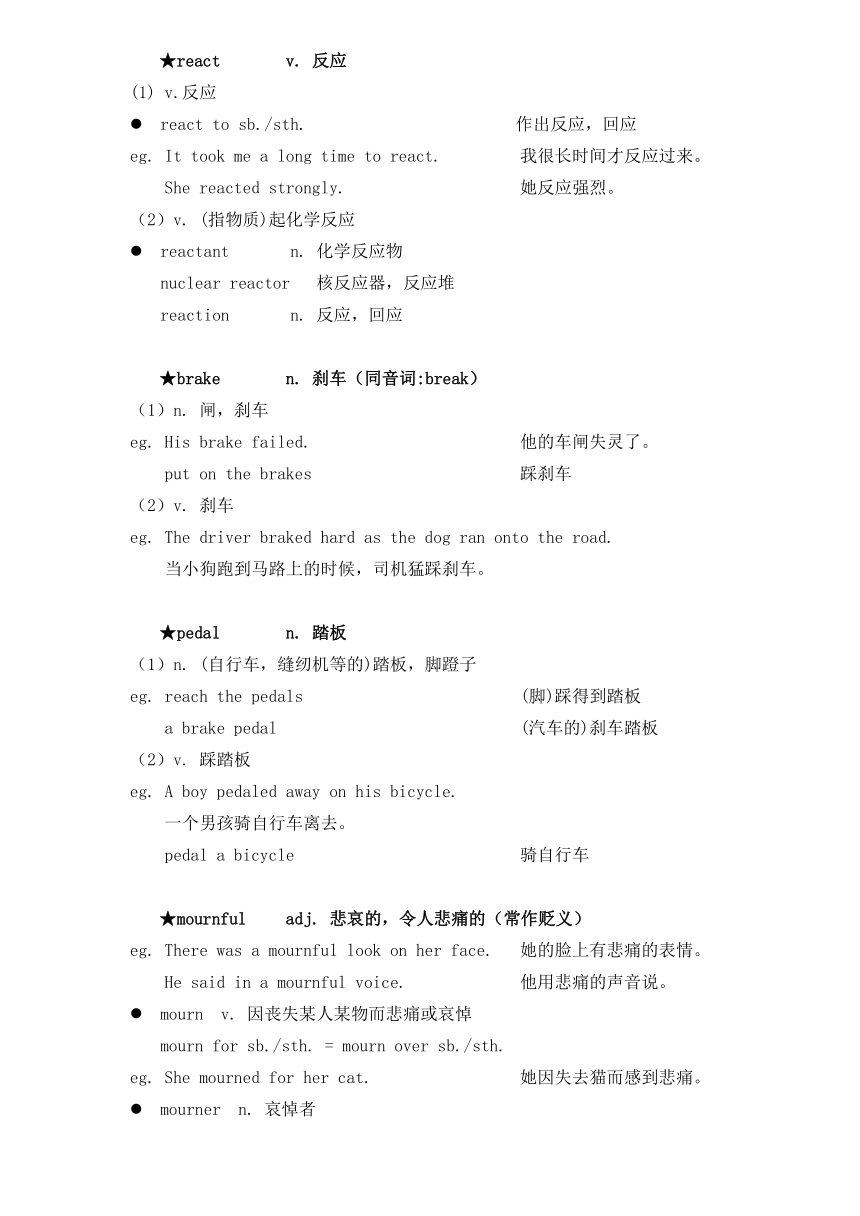
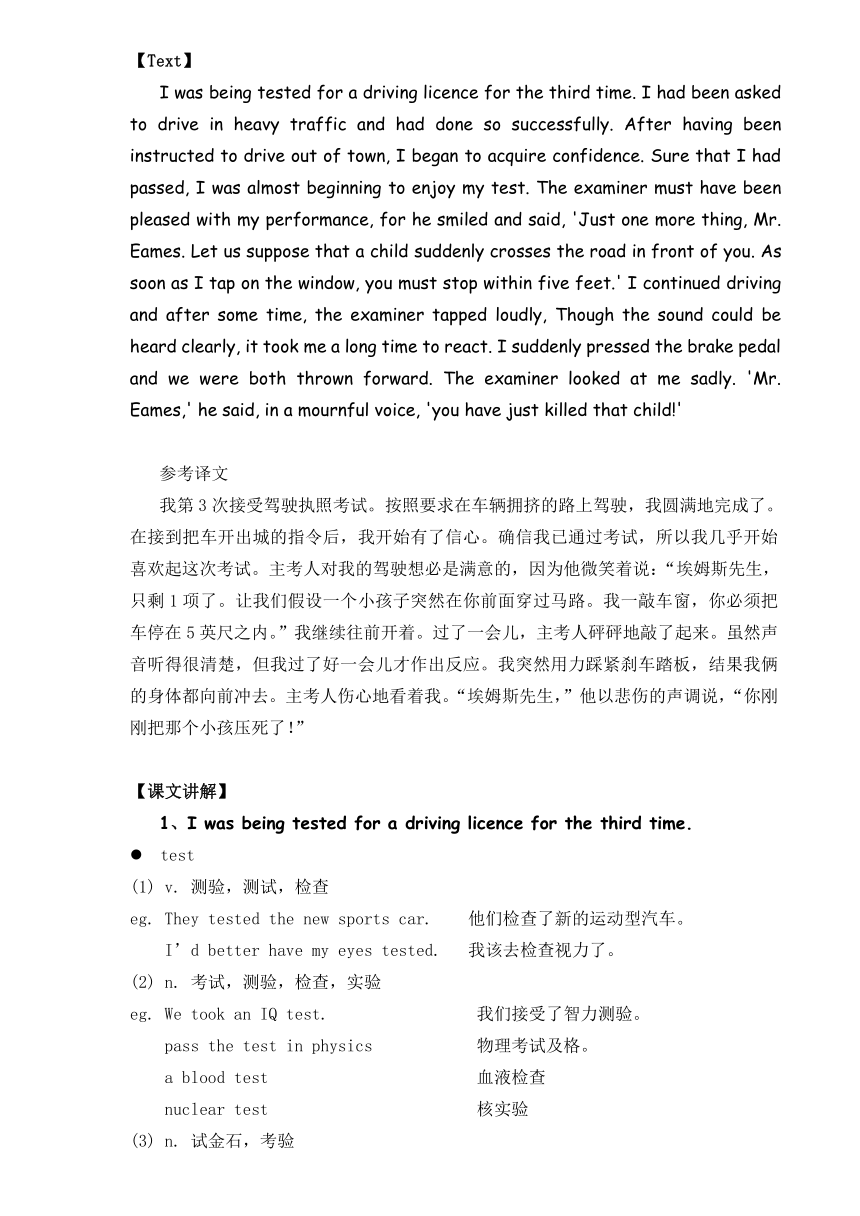
文档简介
Lesson 69 But not murder! 并非谋杀!
【New words and expressions】(11)
murder n. 谋杀
instruct v. 命令,指示
acquire v. 取得,获得
confidence n. 信心
examiner n. 主考人
suppose v. 假设
tap v. 轻敲
react v. 反应
brake n. 刹车
pedal n. 踏板
mournful adj. 悲哀的
★murder n. 谋杀
(1)n. 谋杀,谋杀案 [c]/[u]
eg. be guilty of murder 犯谋杀罪
six murders in a week 一周六起谋杀案
killer n. 杀人犯,职业杀手;屠夫;杀害(其他动物的)动物
kill v. 杀死
(2)v. 谋杀
eg. murder sb. 谋杀某人
murderer n. 谋杀犯,凶手
murderess n. 女谋杀犯,凶手
★instruct v. 命令,指示
(1)v. 向…下命令或指示;指导
eg. instruct sb. about sth.
They haven’t instructed us where to go. 他们没有告诉我们去哪儿。
I instructed him to lock the door. 我命令他去锁门。
The teacher instructed the pupils to come into the gym.
老师命令孩子们去体育馆。
区别:order, demand, direct, tell, instruct
tell 用得最广,语气不太强,是日常生活用语
order 语气较强,为有权威者用以指示别人服从
instruct与direct 意为对需采取的行动有准确说明(均用于客观的及公事的场合)
command 主要用于军事场合
eg. The officer commanded his men to fire. 军官命令士兵们开火。
(2)v. 教授,传授
instruct sb. in
eg. Mr. White instructs us in maths. 怀特先生教我们数学。
instruct a class in history 教一个班的历史
instructor n. 教员;教练;指导员
instruction n.[u]传授,教导/ [c]命令,指示
★acquire v. 取得,获得
(1)v. (靠自己的能力、努力或行为而)获得,得到(同义词gain)
eg. acquire a reputation of dishonesty 得到不诚实的名声
acquire confidence 有了信心
(2)v. 学得(知识,技术),养成(习惯,行为,嗜好)
eg. She acquired a knowledge of French. 她学会了法语。
acquire a habit of smoking 养成了吸烟的习惯
acquire a bad reputation 养成一个坏的名声
acquisition n. 获得,得到
区别: acquire v. 获得,得到
inquire v. 询问
★confidence n. [u]信心;把握;信赖
confidence in sb./sth.
have confidence in sb. 对某人抱有信心
lose confidence in sb. 对某人失去信心
be full of confidence 充满信心
eg. You should have confidence in yourself. 你应该对自己有信心。
He answered the questions with confidence. 他自信地回答这些问题。
confident adj. 有信心的,自信的
★examiner n. 主考人
examine
v. 调查,检查,研讨
eg. You’d better examine the old records.
你最好检查一下旧的记录。
We had our suitcases examined at the airport.
我们的手提箱在机场被检查。
v. 测验
eg. I examined the students in English on the previous lessons.
我就英语课前面所学的课文来考察学生。
(3)v. 诊察,检查疾病
eg. The doctor examined him thoroughly. 医生给他作了彻底地检查。
examiner n. 主考人
examinee n. 被考人
examination n. 考试(较正式)(exam)
★suppose v. 假设
(1)v. 假定,假设
eg. Suppose that this statement is right. 假设这个陈述是正确的。
Suppose the girl to be your daughter. 假如那个女孩是你女儿。
(2)v. 认为,猜想
eg. I suppose she’ll be there today. 我想她今天会去那儿的。
—Will he come —Yes, I suppose so. 他会来吗?是的,我这样想的。
John supposed that he was a teacher. 约翰认为他是个老师。
be supposed to 理应,应当
eg. He is supposed to be there on time. 他理应按时赶到那儿。
We are supposed to help each other. 我们理应互相帮助。
★tap v. 轻敲
(1)v. 轻拍某人,轻敲某物
tap at sth. = tap on sth. 轻拍某物
tap sb. on the shoulder 轻拍某人的肩膀
eg. He tapped on the window. 他轻敲窗户。
(2)n. 轻快的敲击声
n. 水龙头
eg. turn on/off a tap 扭开/关闭水龙头
tap water 自来水
★react v. 反应
(1) v.反应
react to sb./sth. 作出反应,回应
eg. It took me a long time to react. 我很长时间才反应过来。
She reacted strongly. 她反应强烈。
(2)v. (指物质)起化学反应
reactant n. 化学反应物
nuclear reactor 核反应器,反应堆
reaction n. 反应,回应
★brake n. 刹车(同音词:break)
(1)n. 闸,刹车
eg. His brake failed. 他的车闸失灵了。
put on the brakes 踩刹车
(2)v. 刹车
eg. The driver braked hard as the dog ran onto the road.
当小狗跑到马路上的时候,司机猛踩刹车。
★pedal n. 踏板
(1)n. (自行车,缝纫机等的)踏板,脚蹬子
eg. reach the pedals (脚)踩得到踏板
a brake pedal (汽车的)刹车踏板
(2)v. 踩踏板
eg. A boy pedaled away on his bicycle.
一个男孩骑自行车离去。
pedal a bicycle 骑自行车
★mournful adj. 悲哀的,令人悲痛的(常作贬义)
eg. There was a mournful look on her face. 她的脸上有悲痛的表情。
He said in a mournful voice. 他用悲痛的声音说。
mourn v. 因丧失某人某物而悲痛或哀悼
mourn for sb./sth. = mourn over sb./sth.
eg. She mourned for her cat. 她因失去猫而感到悲痛。
mourner n. 哀悼者
【Text】
I was being tested for a driving licence for the third time. I had been asked to drive in heavy traffic and had done so successfully. After having been instructed to drive out of town, I began to acquire confidence. Sure that I had passed, I was almost beginning to enjoy my test. The examiner must have been pleased with my performance, for he smiled and said, 'Just one more thing, Mr. Eames. Let us suppose that a child suddenly crosses the road in front of you. As soon as I tap on the window, you must stop within five feet.' I continued driving and after some time, the examiner tapped loudly, Though the sound could be heard clearly, it took me a long time to react. I suddenly pressed the brake pedal and we were both thrown forward. The examiner looked at me sadly. 'Mr. Eames,' he said, in a mournful voice, 'you have just killed that child!'
参考译文
我第3次接受驾驶执照考试。按照要求在车辆拥挤的路上驾驶,我圆满地完成了。在接到把车开出城的指令后,我开始有了信心。确信我已通过考试,所以我几乎开始喜欢起这次考试。主考人对我的驾驶想必是满意的,因为他微笑着说:“埃姆斯先生,只剩1项了。让我们假设一个小孩子突然在你前面穿过马路。我一敲车窗,你必须把车停在5英尺之内。”我继续往前开着。过了一会儿,主考人砰砰地敲了起来。虽然声音听得很清楚,但我过了好一会儿才作出反应。我突然用力踩紧刹车踏板,结果我俩的身体都向前冲去。主考人伤心地看着我。“埃姆斯先生,”他以悲伤的声调说,“你刚刚把那个小孩压死了!”
【课文讲解】
1、I was being tested for a driving licence for the third time.
test
v. 测验,测试,检查
eg. They tested the new sports car. 他们检查了新的运动型汽车。
I’d better have my eyes tested. 我该去检查视力了。
n. 考试,测验,检查,实验
eg. We took an IQ test. 我们接受了智力测验。
pass the test in physics 物理考试及格。
a blood test 血液检查
nuclear test 核实验
n. 试金石,考验
eg. Their affection has stood the test of time.
他们的爱情经得起时间的考验。
test drive 试车
= have a test drive
licence
n. 执照
eg. a driving licence 驾驶执照
v. 给予,许可(licence/ license)
eg. practice licence 营业执照
advice n./ advise v. 建议
practice n./ practise v. 练习
2、I had been asked to drive in heavy traffic and had done so successfully.
drive
v.驾驶(汽车); 驱赶(牛,马等)
eg. drive a car/truck/horse 开小车/卡车/赶马
v. 用车送人,载人
eg. Can I drive you home 我能送你回家吗?
Can I drive you to the station 我能送你去车站吗?
v. 赶走
eg. Can you drive the dog away 你能赶走那只狗吗?
v. 迫使,逼迫
eg. The death of her son drove her mad. 她儿子的死把她逼疯了。
Failure drove him to suicide. 失败逼得他自杀了。
drive at 意指,打算,想说(用进行时)
eg. What are you driving at 你打算干什么?
go for a drive 我打算开车去兜风。
n. 路程,车程
eg. It’s only a few minutes’ drive to the station.
这里离车站只有几分钟车程。
drive in 免下车餐厅(顾客不下车即可吃饭、看电影、付钱等)
heavy traffic 交通流量大
= a lot of traffic
traffic jam 交通阻塞
traffic lights 红绿灯
= traffic signals
traffic circle (美)道路的环状交叉口
traffic accident 交通事故
3、After having been instructed to drive out of town, I began to acquire confidence.
having been instructed 动名词短语完成时态的被动形式
acquire confidence 获得信心
4、Sure that I had passed, I was almost beginning to enjoy my test.
sure adj. 确信
eg. I am sure. 我很确信。
being sure (文中是省略了being的现在分词短语)
pass
n. (口)困难,难关
e to a pretty pass 陷入困境
= come to a fine pass
= come to a sad pass
= come to a nice pass
n. 免费票,免费乘车证
eg. free pass 免费票
show a pass before entering 入场前出示入场券
n. 山路
eg. a mountain pass 山路
v. (考试等)合格,通过(考试等)
eg. Of fifty applicants, only ten passed. 50个申请者,只有10人通过。
Pass in physics. 物理考试及格。
v. 把…递给,传递
eg. Will you pass me the salt 把盐递给我好吗?
Please pass her this list 请把这个表格递给她。
v. 通过,经过
eg. The new freeway will pass over the lake. 新的高速公路将在湖的上方穿过。
The road is only wide enough for small cars to pass.
这条路的宽度只够一些小车经过。
pass away 去世(die的婉转语)
pass through 穿过,经历
pass on 继续往前走;转移到(下一个话题)
eg. Pass on, please.请不要停止。
Let’s pass on to the next subject. 让我们继续下一个话题吧。
enjoy 指从某种活动或事物中得到欢乐,宾语始终是活动或事物,
人作主语。
entertain 招待,款待,使…欢乐,使…娱乐
amuse 逗…笑,给…娱乐(或消遣)
(比entertain更常用,两者的宾语都只能是人。)
eg. I never enjoy practicing the piano. 我从来不喜欢弹钢琴。
I was almost beginning to enjoy my test. 我开始喜欢这个考试了。
We enjoyed ourselves at the party. 在聚会上我们玩得很痛快。
He entertained me to dinner. 他请我吃饭。
He entertained everybody with his clever tricks.
他精彩的戏法使大家都很高兴。
The children were amused by the circus clown. (they laughed.)
孩子们被马戏团小丑逗乐了。
His funny stories amused us all. (they made us laugh.)
他把我们都逗乐了。
That child can amuse himself for hours playing in the sand.
(He can pass his time happily.)
那个孩子可以一个人在沙发上玩几个小时。
5、The examiner must have been pleased with my performance, for he smiled and said, 'Just one more thing, Mr. Eames.
must have been pleased 一定非常满意
must have done 表示对过去的事情的推测
be pleased with 对…满意
performance n.
(1)n. 成果,成绩
eg. a fine performance 好成绩,良好的表现
(2)n. 公演,上演
eg. give a performance a day 一天上演一场
(3)n. 实行,履行
eg. He is excellent in the performance of his duties.
他的工作表现尤为出色。
6、Let us suppose that a child suddenly crosses the road in front of you.
suppose 当“假定,以为”讲时,如果后面的从句被看成是一种事实,则不用虚拟语气;若只是一种假设,不当真,用虚拟语气。
eg. Suppose that his statement is right. 假定他的陈述是真的。
All of his friends will suppose that she is his wife.
他所有的朋友都认为她是他的妻子。
Suppose you had one million dollars, what would you do
假设你有一百万美元,你会怎么做?
Suppose you were him, what would you do
假设你是他,你会怎么做?
7、As soon as I tap on the window, you must stop within five feet.'
within prep. 不超过;在(某范围)之内
eg. She returned within an hour. 她一个小时内就回来了。
a house within a mile of the station 距火车站不到一英里的一所房子
We are now within sight of the shore. 我们现在的距离能看到海岸了。
There’s a bell within the patient’s reach.
在病人伸手可够得着的地方有个电铃。
8、I continued driving and after some time, the examiner tapped loudly, Though the sound could be heard clearly, it took me a long time to react. I suddenly pressed the brake pedal and we were both thrown forward.
it took me a long time to react 我好大一会儿才反应过来
(it took sb. some time to do sth. 不定式是真正的主语, it是形式主语,避免头重脚轻)
9、The examiner looked at me sadly. 'Mr. Eames,' he said, in a mournful voice, 'you have just killed that child!'
in a mournful voice 以悲哀的声调
(in a … voice 以……的声调)
voice n.
声音,嗓子
eg. in an angry voice 以生气的声调
in a sad voice 以悲伤的声调
in a cheerful voice 以欢快的声调
be in good voice 声音嘹亮,嗓子好
lose one’s voice 嗓子哑了
raise one’s voice 提高声调
with one voice 异口同声地
(2) 意见,心声
eg. the voice of the citizen 市民的心声
campus voice 校园心声
give voice to 说出意见,吐露(感情等)
(3) 歌声
eg. a male voice 男声
a female voice 女声
(4)呼声
eg. the voice of reason 理性的呼声
【Key structures】
被动语态
被动语态: be + done
动名词的被动语态:being + done/ having been + done
eg. It was made in Germany in 1681.
I told you it could be done.
After being arrested, the man confessed that he had stolen the money.
= After he was arrested, the man confessed that he had stolen the money.
被捕之后,这人承认偷了钱。
被动语态可以用于“介词+动名词”结构中,在英语中是很正式的用法,一般不用于口语。“介词(after,before,on)+动名词”这个结构通常相当于一个时间状语从句。如果两个动作中有一个在另一个开始之前已经完成,则可以用“after +动名词的完成式”表示第一个动作;如果只表示先后顺序,则可用“after/before +动名词”结构;“on +动名词”通常表示两个动作几乎同时发生:
The man called the police after being robbed.
He killed a child before being arrested.
On/After being told that her mother was seriously ill, she hurried back to England.
被动语态用于want后面的不定式中时,to be可以省略,want后跟被动语态时往往表示希望别人完成所说的动作:
I want the luggage fetched from the hotel this afternoon.
被动语态还可用于过去进行时,以强调动作的持续性:
I was being asked about the film all day yesterday.
【Special Difficulties】
Practice and Advice
practice n.(反复的)练习,实践,实行
Your spoken English will improve with practice.
Have they put their plan into practice 他们把计划付诸实施了吗?
practise vt.& vi. 练习,经常做
Jimmy used to practice (playing) football every afternoon.
She practises on the piano for three hours every day.
advice n. 忠告,劝告,建议(不可数名词)
She gave me some good advice / a piece of advice about jobs.
advise vt.& vi. 劝告,向……提供提议
She advised me against going to the party. 她建议/劝我不要去参加聚会。
Enjoy, Entertain and Amuse
enjoy vt. 欣赏,喜爱,享受……之乐(后跟名词、动名词或反身代词,用于主动语态)
I enjoy swimming in summer.
We’re really enjoying ourselves.
entertain vt. 款待,招待,请客;使……快乐,给……娱乐(=amuse)
We often entertain friends at weekends.
Uncle Sam entertains/amuses the children for hours at a time.
萨姆叔叔一连好几小时地逗孩子们乐。
My children can entertain/amuse themselves for hours with telling stories to each other.
amuse vt. 逗乐,逗笑(常用于被动语态)
She was amused by her father’s funny stories.
His story amused the children very much.
【New words and expressions】(11)
murder n. 谋杀
instruct v. 命令,指示
acquire v. 取得,获得
confidence n. 信心
examiner n. 主考人
suppose v. 假设
tap v. 轻敲
react v. 反应
brake n. 刹车
pedal n. 踏板
mournful adj. 悲哀的
★murder n. 谋杀
(1)n. 谋杀,谋杀案 [c]/[u]
eg. be guilty of murder 犯谋杀罪
six murders in a week 一周六起谋杀案
killer n. 杀人犯,职业杀手;屠夫;杀害(其他动物的)动物
kill v. 杀死
(2)v. 谋杀
eg. murder sb. 谋杀某人
murderer n. 谋杀犯,凶手
murderess n. 女谋杀犯,凶手
★instruct v. 命令,指示
(1)v. 向…下命令或指示;指导
eg. instruct sb. about sth.
They haven’t instructed us where to go. 他们没有告诉我们去哪儿。
I instructed him to lock the door. 我命令他去锁门。
The teacher instructed the pupils to come into the gym.
老师命令孩子们去体育馆。
区别:order, demand, direct, tell, instruct
tell 用得最广,语气不太强,是日常生活用语
order 语气较强,为有权威者用以指示别人服从
instruct与direct 意为对需采取的行动有准确说明(均用于客观的及公事的场合)
command 主要用于军事场合
eg. The officer commanded his men to fire. 军官命令士兵们开火。
(2)v. 教授,传授
instruct sb. in
eg. Mr. White instructs us in maths. 怀特先生教我们数学。
instruct a class in history 教一个班的历史
instructor n. 教员;教练;指导员
instruction n.[u]传授,教导/ [c]命令,指示
★acquire v. 取得,获得
(1)v. (靠自己的能力、努力或行为而)获得,得到(同义词gain)
eg. acquire a reputation of dishonesty 得到不诚实的名声
acquire confidence 有了信心
(2)v. 学得(知识,技术),养成(习惯,行为,嗜好)
eg. She acquired a knowledge of French. 她学会了法语。
acquire a habit of smoking 养成了吸烟的习惯
acquire a bad reputation 养成一个坏的名声
acquisition n. 获得,得到
区别: acquire v. 获得,得到
inquire v. 询问
★confidence n. [u]信心;把握;信赖
confidence in sb./sth.
have confidence in sb. 对某人抱有信心
lose confidence in sb. 对某人失去信心
be full of confidence 充满信心
eg. You should have confidence in yourself. 你应该对自己有信心。
He answered the questions with confidence. 他自信地回答这些问题。
confident adj. 有信心的,自信的
★examiner n. 主考人
examine
v. 调查,检查,研讨
eg. You’d better examine the old records.
你最好检查一下旧的记录。
We had our suitcases examined at the airport.
我们的手提箱在机场被检查。
v. 测验
eg. I examined the students in English on the previous lessons.
我就英语课前面所学的课文来考察学生。
(3)v. 诊察,检查疾病
eg. The doctor examined him thoroughly. 医生给他作了彻底地检查。
examiner n. 主考人
examinee n. 被考人
examination n. 考试(较正式)(exam)
★suppose v. 假设
(1)v. 假定,假设
eg. Suppose that this statement is right. 假设这个陈述是正确的。
Suppose the girl to be your daughter. 假如那个女孩是你女儿。
(2)v. 认为,猜想
eg. I suppose she’ll be there today. 我想她今天会去那儿的。
—Will he come —Yes, I suppose so. 他会来吗?是的,我这样想的。
John supposed that he was a teacher. 约翰认为他是个老师。
be supposed to 理应,应当
eg. He is supposed to be there on time. 他理应按时赶到那儿。
We are supposed to help each other. 我们理应互相帮助。
★tap v. 轻敲
(1)v. 轻拍某人,轻敲某物
tap at sth. = tap on sth. 轻拍某物
tap sb. on the shoulder 轻拍某人的肩膀
eg. He tapped on the window. 他轻敲窗户。
(2)n. 轻快的敲击声
n. 水龙头
eg. turn on/off a tap 扭开/关闭水龙头
tap water 自来水
★react v. 反应
(1) v.反应
react to sb./sth. 作出反应,回应
eg. It took me a long time to react. 我很长时间才反应过来。
She reacted strongly. 她反应强烈。
(2)v. (指物质)起化学反应
reactant n. 化学反应物
nuclear reactor 核反应器,反应堆
reaction n. 反应,回应
★brake n. 刹车(同音词:break)
(1)n. 闸,刹车
eg. His brake failed. 他的车闸失灵了。
put on the brakes 踩刹车
(2)v. 刹车
eg. The driver braked hard as the dog ran onto the road.
当小狗跑到马路上的时候,司机猛踩刹车。
★pedal n. 踏板
(1)n. (自行车,缝纫机等的)踏板,脚蹬子
eg. reach the pedals (脚)踩得到踏板
a brake pedal (汽车的)刹车踏板
(2)v. 踩踏板
eg. A boy pedaled away on his bicycle.
一个男孩骑自行车离去。
pedal a bicycle 骑自行车
★mournful adj. 悲哀的,令人悲痛的(常作贬义)
eg. There was a mournful look on her face. 她的脸上有悲痛的表情。
He said in a mournful voice. 他用悲痛的声音说。
mourn v. 因丧失某人某物而悲痛或哀悼
mourn for sb./sth. = mourn over sb./sth.
eg. She mourned for her cat. 她因失去猫而感到悲痛。
mourner n. 哀悼者
【Text】
I was being tested for a driving licence for the third time. I had been asked to drive in heavy traffic and had done so successfully. After having been instructed to drive out of town, I began to acquire confidence. Sure that I had passed, I was almost beginning to enjoy my test. The examiner must have been pleased with my performance, for he smiled and said, 'Just one more thing, Mr. Eames. Let us suppose that a child suddenly crosses the road in front of you. As soon as I tap on the window, you must stop within five feet.' I continued driving and after some time, the examiner tapped loudly, Though the sound could be heard clearly, it took me a long time to react. I suddenly pressed the brake pedal and we were both thrown forward. The examiner looked at me sadly. 'Mr. Eames,' he said, in a mournful voice, 'you have just killed that child!'
参考译文
我第3次接受驾驶执照考试。按照要求在车辆拥挤的路上驾驶,我圆满地完成了。在接到把车开出城的指令后,我开始有了信心。确信我已通过考试,所以我几乎开始喜欢起这次考试。主考人对我的驾驶想必是满意的,因为他微笑着说:“埃姆斯先生,只剩1项了。让我们假设一个小孩子突然在你前面穿过马路。我一敲车窗,你必须把车停在5英尺之内。”我继续往前开着。过了一会儿,主考人砰砰地敲了起来。虽然声音听得很清楚,但我过了好一会儿才作出反应。我突然用力踩紧刹车踏板,结果我俩的身体都向前冲去。主考人伤心地看着我。“埃姆斯先生,”他以悲伤的声调说,“你刚刚把那个小孩压死了!”
【课文讲解】
1、I was being tested for a driving licence for the third time.
test
v. 测验,测试,检查
eg. They tested the new sports car. 他们检查了新的运动型汽车。
I’d better have my eyes tested. 我该去检查视力了。
n. 考试,测验,检查,实验
eg. We took an IQ test. 我们接受了智力测验。
pass the test in physics 物理考试及格。
a blood test 血液检查
nuclear test 核实验
n. 试金石,考验
eg. Their affection has stood the test of time.
他们的爱情经得起时间的考验。
test drive 试车
= have a test drive
licence
n. 执照
eg. a driving licence 驾驶执照
v. 给予,许可(licence/ license)
eg. practice licence 营业执照
advice n./ advise v. 建议
practice n./ practise v. 练习
2、I had been asked to drive in heavy traffic and had done so successfully.
drive
v.驾驶(汽车); 驱赶(牛,马等)
eg. drive a car/truck/horse 开小车/卡车/赶马
v. 用车送人,载人
eg. Can I drive you home 我能送你回家吗?
Can I drive you to the station 我能送你去车站吗?
v. 赶走
eg. Can you drive the dog away 你能赶走那只狗吗?
v. 迫使,逼迫
eg. The death of her son drove her mad. 她儿子的死把她逼疯了。
Failure drove him to suicide. 失败逼得他自杀了。
drive at 意指,打算,想说(用进行时)
eg. What are you driving at 你打算干什么?
go for a drive 我打算开车去兜风。
n. 路程,车程
eg. It’s only a few minutes’ drive to the station.
这里离车站只有几分钟车程。
drive in 免下车餐厅(顾客不下车即可吃饭、看电影、付钱等)
heavy traffic 交通流量大
= a lot of traffic
traffic jam 交通阻塞
traffic lights 红绿灯
= traffic signals
traffic circle (美)道路的环状交叉口
traffic accident 交通事故
3、After having been instructed to drive out of town, I began to acquire confidence.
having been instructed 动名词短语完成时态的被动形式
acquire confidence 获得信心
4、Sure that I had passed, I was almost beginning to enjoy my test.
sure adj. 确信
eg. I am sure. 我很确信。
being sure (文中是省略了being的现在分词短语)
pass
n. (口)困难,难关
e to a pretty pass 陷入困境
= come to a fine pass
= come to a sad pass
= come to a nice pass
n. 免费票,免费乘车证
eg. free pass 免费票
show a pass before entering 入场前出示入场券
n. 山路
eg. a mountain pass 山路
v. (考试等)合格,通过(考试等)
eg. Of fifty applicants, only ten passed. 50个申请者,只有10人通过。
Pass in physics. 物理考试及格。
v. 把…递给,传递
eg. Will you pass me the salt 把盐递给我好吗?
Please pass her this list 请把这个表格递给她。
v. 通过,经过
eg. The new freeway will pass over the lake. 新的高速公路将在湖的上方穿过。
The road is only wide enough for small cars to pass.
这条路的宽度只够一些小车经过。
pass away 去世(die的婉转语)
pass through 穿过,经历
pass on 继续往前走;转移到(下一个话题)
eg. Pass on, please.请不要停止。
Let’s pass on to the next subject. 让我们继续下一个话题吧。
enjoy 指从某种活动或事物中得到欢乐,宾语始终是活动或事物,
人作主语。
entertain 招待,款待,使…欢乐,使…娱乐
amuse 逗…笑,给…娱乐(或消遣)
(比entertain更常用,两者的宾语都只能是人。)
eg. I never enjoy practicing the piano. 我从来不喜欢弹钢琴。
I was almost beginning to enjoy my test. 我开始喜欢这个考试了。
We enjoyed ourselves at the party. 在聚会上我们玩得很痛快。
He entertained me to dinner. 他请我吃饭。
He entertained everybody with his clever tricks.
他精彩的戏法使大家都很高兴。
The children were amused by the circus clown. (they laughed.)
孩子们被马戏团小丑逗乐了。
His funny stories amused us all. (they made us laugh.)
他把我们都逗乐了。
That child can amuse himself for hours playing in the sand.
(He can pass his time happily.)
那个孩子可以一个人在沙发上玩几个小时。
5、The examiner must have been pleased with my performance, for he smiled and said, 'Just one more thing, Mr. Eames.
must have been pleased 一定非常满意
must have done 表示对过去的事情的推测
be pleased with 对…满意
performance n.
(1)n. 成果,成绩
eg. a fine performance 好成绩,良好的表现
(2)n. 公演,上演
eg. give a performance a day 一天上演一场
(3)n. 实行,履行
eg. He is excellent in the performance of his duties.
他的工作表现尤为出色。
6、Let us suppose that a child suddenly crosses the road in front of you.
suppose 当“假定,以为”讲时,如果后面的从句被看成是一种事实,则不用虚拟语气;若只是一种假设,不当真,用虚拟语气。
eg. Suppose that his statement is right. 假定他的陈述是真的。
All of his friends will suppose that she is his wife.
他所有的朋友都认为她是他的妻子。
Suppose you had one million dollars, what would you do
假设你有一百万美元,你会怎么做?
Suppose you were him, what would you do
假设你是他,你会怎么做?
7、As soon as I tap on the window, you must stop within five feet.'
within prep. 不超过;在(某范围)之内
eg. She returned within an hour. 她一个小时内就回来了。
a house within a mile of the station 距火车站不到一英里的一所房子
We are now within sight of the shore. 我们现在的距离能看到海岸了。
There’s a bell within the patient’s reach.
在病人伸手可够得着的地方有个电铃。
8、I continued driving and after some time, the examiner tapped loudly, Though the sound could be heard clearly, it took me a long time to react. I suddenly pressed the brake pedal and we were both thrown forward.
it took me a long time to react 我好大一会儿才反应过来
(it took sb. some time to do sth. 不定式是真正的主语, it是形式主语,避免头重脚轻)
9、The examiner looked at me sadly. 'Mr. Eames,' he said, in a mournful voice, 'you have just killed that child!'
in a mournful voice 以悲哀的声调
(in a … voice 以……的声调)
voice n.
声音,嗓子
eg. in an angry voice 以生气的声调
in a sad voice 以悲伤的声调
in a cheerful voice 以欢快的声调
be in good voice 声音嘹亮,嗓子好
lose one’s voice 嗓子哑了
raise one’s voice 提高声调
with one voice 异口同声地
(2) 意见,心声
eg. the voice of the citizen 市民的心声
campus voice 校园心声
give voice to 说出意见,吐露(感情等)
(3) 歌声
eg. a male voice 男声
a female voice 女声
(4)呼声
eg. the voice of reason 理性的呼声
【Key structures】
被动语态
被动语态: be + done
动名词的被动语态:being + done/ having been + done
eg. It was made in Germany in 1681.
I told you it could be done.
After being arrested, the man confessed that he had stolen the money.
= After he was arrested, the man confessed that he had stolen the money.
被捕之后,这人承认偷了钱。
被动语态可以用于“介词+动名词”结构中,在英语中是很正式的用法,一般不用于口语。“介词(after,before,on)+动名词”这个结构通常相当于一个时间状语从句。如果两个动作中有一个在另一个开始之前已经完成,则可以用“after +动名词的完成式”表示第一个动作;如果只表示先后顺序,则可用“after/before +动名词”结构;“on +动名词”通常表示两个动作几乎同时发生:
The man called the police after being robbed.
He killed a child before being arrested.
On/After being told that her mother was seriously ill, she hurried back to England.
被动语态用于want后面的不定式中时,to be可以省略,want后跟被动语态时往往表示希望别人完成所说的动作:
I want the luggage fetched from the hotel this afternoon.
被动语态还可用于过去进行时,以强调动作的持续性:
I was being asked about the film all day yesterday.
【Special Difficulties】
Practice and Advice
practice n.(反复的)练习,实践,实行
Your spoken English will improve with practice.
Have they put their plan into practice 他们把计划付诸实施了吗?
practise vt.& vi. 练习,经常做
Jimmy used to practice (playing) football every afternoon.
She practises on the piano for three hours every day.
advice n. 忠告,劝告,建议(不可数名词)
She gave me some good advice / a piece of advice about jobs.
advise vt.& vi. 劝告,向……提供提议
She advised me against going to the party. 她建议/劝我不要去参加聚会。
Enjoy, Entertain and Amuse
enjoy vt. 欣赏,喜爱,享受……之乐(后跟名词、动名词或反身代词,用于主动语态)
I enjoy swimming in summer.
We’re really enjoying ourselves.
entertain vt. 款待,招待,请客;使……快乐,给……娱乐(=amuse)
We often entertain friends at weekends.
Uncle Sam entertains/amuses the children for hours at a time.
萨姆叔叔一连好几小时地逗孩子们乐。
My children can entertain/amuse themselves for hours with telling stories to each other.
amuse vt. 逗乐,逗笑(常用于被动语态)
She was amused by her father’s funny stories.
His story amused the children very much.
同课章节目录
